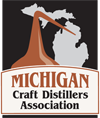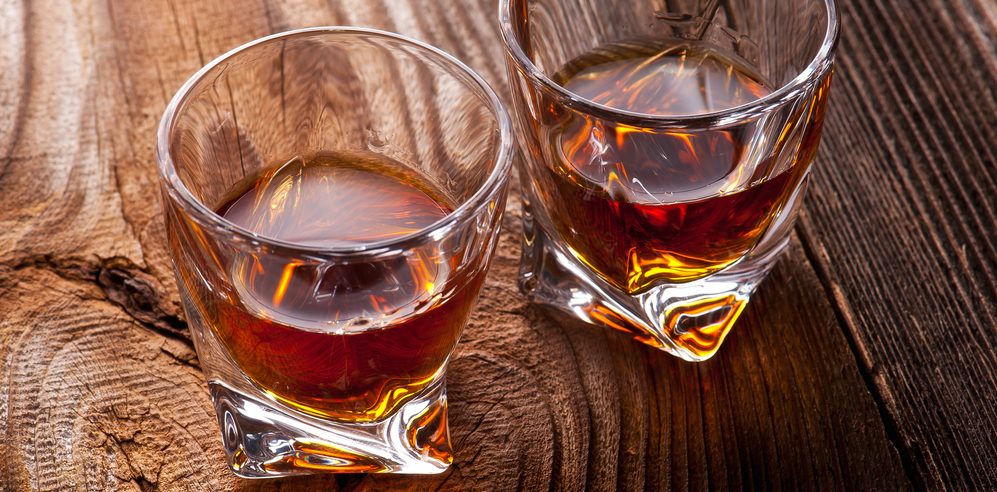(TRAVERSE CITY, MICH) — The craft distilling industry is growing, not only in Michigan but throughout the United States. Yet, there is concern about some of the spirits introduced into the marketplace as “craft” when in fact they may be purchased in volume from out-of-state producers, then bottled and distributed as a “local” product. This issue, as well as truth in labeling is something the Michigan Craft Distillers Association (MCDA) has been paying attention to since it was formed in 2014.
“A large part of our discussion as we were organizing was what defined a ‘craft distiller’ in Michigan,” says Dianna Stampfler, MCDA Executive Director. “When a distillery joins our association, they have to identify which type of operation they are and we trust that they’re being clear with us for the sake of our overall industry.”
The MCDA defines a “Craft Distiller” as “a distilling organization or brand that produces a distilled product at a facility in Michigan. The Michigan distillery must hold Federal Distilled Spirits Plant (DSP) and Michigan Small Distillers Licenses. And at least 51% of the products produced are fermented and distilled on the licensed premises.” A “Merchant Distiller” “holds Federal Distilled Spirits Plant (DSP) and Michigan Small Distillers Licenses and acts as an independent rectifier, blender or bottler on the licensed premises.”
“It’s not as much those who are buying spirits from others—including some producers right here in Michigan,” Stampfler continues, “but that they’re honest about it with consumers, which means identifying the product as such on their back label.”
Earlier this week, NBC News published a story titled “Behind the misleading claims fueling America’s bourbon boom” with a sub-title which really digs into the heart of the issue: “Drawn to the ‘small batch’ or ‘hand-crafted’ bourbon at your liquor store? Turns out, those phrases might not mean much.”
“This national attention on the topics of disclosure in labeling and truth in sourcing gives us an opportunity to educate consumers here in Michigan in other states where our spirits are sold,” says Jon O’Connor, co-founder of Long Road Distillers in Grand Rapids and MCDA President. “The consumer, and even the retail and restaurant industries, may think they’re buying a ‘local’ spirit because the distillery operation is based in Michigan, but that may not actually be the case. It’s sad that we have to put the burden of proof on the consumer to verify where a spirit is produced because some producers aren’t being transparent with the information.”
This issue was first brought to media attention in Michigan in January 2016 when the Grand Rapids Business Journal ran an article titled “Distillers grapple with truth in advertising” which quotes Kent Rabish, owner of Grand Traverse Distillery (and a founding MCDA board member):
“There are a variety of descriptions that can be slapped on a label, including, ‘Distilled in,’ ‘Bottled In,’ ‘Manufactured In,’ ‘Produced In,’ ‘Aged In’ and any combination of those. Just because a label reads ‘Bottled in Michigan’ does not mean the spirits were made in Michigan. If it reads anything other than ‘distilled,’ at least in whiskey, it wasn’t made by the company.”
A 2016 post on Food52.com titled “What Does the “Craft” in “Craft Spirit” Really Mean?” stated “market researchers claim that more and more people are looking for brands with craft credentials, spirits made by real people in a traditional way…with stats like these, it makes sense that suddenly everyone wants to be craft—and that many companies that make spirits in a very non-craft way have claimed the craft mantle.”
The article suggests ignoring words like “craft,” “handmade,” “artisanal,” and “small batch” and instead read the small print on the various parts of the label.
“The bottle is also supposed to tell you the state of distillation (though that is only recently being enforced), so that you can check if it was distilled in the same state as the distillery or elsewhere. You’ll also find small print that tells you whether something is ‘distilled from grain,’ ‘distilled from neutral grain spirits,’ or from other ingredients like ‘distilled from molasses,’ though these rules vary from one spirit to another.”
So, the bottom line for those wanting a true local spirit, look for “Distilled In” on the back label.
Not all Michigan whiskeys are made here in the Great Lakes State (often because it takes 18 to 24 months to age, making it impossible for distilleries to offer their own product at the onset), yet not all producers are trying to hide that fact.
Iron Fish Distillery in Thompsonville says they sampled over a dozen out-of-state products and selected one that they brought home to be blended and aged in maple syrup or tawny port barrels, developing a unique tasting spirit when they opened in 2016. On the back of their labels, they clearly state this fact and invite consumers to enjoy this blended spirit while they wait for their own aged whiskey to hit the shelves later this year.
The Michigan Craft Distillers Association was formed in October 2104 as a non-profit organization charged with marketing the individual member businesses, their products and events, but also help bring a voice for the industry when it comes to legislative issues that affect the overall beverage industry.
MCDA currently represents more than two dozen distilleries with nearly 40 unique tasting room locations around the state, as well as a handful of distillery in-planning members and nearly 30 allied members. Michigan’s craft distilling industry is growing at a rapid pace – ranking in the “Top 15” states in America for the number of distilleries.

